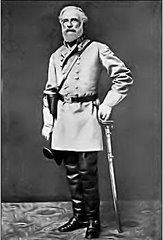My plan is for this to be a four-part series on theology, ultimately leading up to weekly Christian worship, such as its purposes, reasons, what we should do, and why we should do what we should do. To begin, though, I don't want to dive right on in to worship. Along the way, I will speak of salvation, the sacraments, God's Sovereignty, and Its connection with the work of man.
I will begin by speaking of how God's Sovereignty fits in with man's will, or perhaps better put, how man's will fits in under God's Sovereingty. I will begin by stating that I am a Presbyterian, and yes, we are considered Calvinists. But I do not want a misunderstanding here. Although I have full belief in God's Sovereignty, I do believe in some sort of human choice and responsibility, and I do believe that the two can go together.
I believe that all of history is God's eternal plan, but I believe within this plan there are men who do great things by a certain amount of their choice (of course with God's grace in them), and men who do bad things on their own choice. But yet all of this is in God's plan, even though God may reward the good men as if they did something good, and punish the bad men as if they did evil.
Exactly how it works may be a mystery. I know that some non-Calvinist Christians it hits a brick wall. But nonetheless I use the term here. I believe calling it an excuse is much like considering it an excuse to call the incarnation of Jesus, how He was both God and man, a mystery. It is not as if calling it a mystery is an excuse for Christianity when it hits a brick wall, because God can do anything!
But I do not think that we should just stop with the term "mystery." There are often examples in which we see a mystery, but also firmly believe each side of the mystery. I like using Jesus' death as an illustration for how God's Sovereign plan and man's free choice/will/agency (or whatever else you may call it) go together.
It could be argued that for all time God has planned and perhaps predestined for Jesus to come and save sinners. Certainly He knew throughout all time that there should be a time in which Jesus would do this. He knew the time it would happen, and He specifically planned it to happen. Certainly since the Fall of man was it in His eternal plan (although it could be argued that the Fall was in His plan, therefore Jesus' death and ressurection was in His plan even before the Fall). Nonetheless, it was in God's plan for Jesus to come and save sinners even by His death.
But at the same time, the people who nailed Jesus to the cross were still guilty. Do you see the irony? God's plan involved evil people doing evil things, but through which one of the greatest things in mankind has ever happened - Jesus' death and ressurection. Still, those who crucified Jesus are held accountable for their actions next to God. I do not think that God would say, "Well what you did was bad, but I predestined it to happen, so its not your fault." They crucified Jesus by choice, but it was still God's sovereign plan.
Perhaps even salvation is the same general way. Ultimately, salvation is more than just a general "choice." It is not as if someone just says, "Well Heaven sounds better than Hell, so I think I'll be a Christian." Salvation is much more profound than that. Choices are made on general or strict probability. Salvation is an assurance of faith. But even by the same token, because God can do anything, He may allow us a certain amount of special choice in the matter as well. Assuming salvation merely as a typical choice is wrong, but it is sadly a part of typical church doctrine today.
How often do you hear of so many people just getting saved suddenly? It is as if the church's goal is to go to the lost, and then convert them in one night. All the glory to God if this happens, but often salvation does not work this way. One friend of mine put this as if someone said that they were in love with their wife from the moment they saw her. It is not that simple, and for most people salvation is not either. Along the way in a relationship, there are instances in which two people feel real love in an emotional experience, but it is not as if each one of those instances stands alone in their love. Their love is a long road over much time. I remember as a kid being told to "ask Jesus into my heart." It is true that He must come into your heart and save you, but by this watered-down approach, I had several "conversions experiences" because I was always worried I had not sincerely meant the last ones. Finally I realized I must stop saying the simple prayer and just live a Christian life.
C.S. Lewis (perhaps I am wrong on who this person is, but I believe it is Lewis - correct me if you know I'm wrong) once spoke of his salvation in a way unusual to today's theology. He said he got on a train, and sometime by the time he got off the train, he was a Christian. But he could not point to exactly where at on that train. But nonetheless, there was a mysterious time in there in which his whole worldview just radically changed.
So with this said, I believe our salvation is something that is in God's complete control. However He may in His infinite grace and power give us the choice of accepting Him and give us some choice of perserverence. Today Christians see perseverence as God's predestined gift one's we accept Jesus on our own. Yet it is our choice in many of our trials. But I take a somewhat different approach. God's gift of salvation may be given to us by our choice in some mysterious way, but there is also the sense in which God's grace is irresistable and only given by God. Our perseverence certainly includes God's gifts to us in our trials, and Him not pushing us past what we can stand, but there is never a time in which we can just "relax" and not care. Yet even yet we can have full assurance. It really is a mystery, but certainly a mystery of grace. This is really why I called this "Freedestination." It is both free (at least to a point), and destine by God. Again, it is a mystery.
I have said enough for now, as I feel I am hinting on the next three blogs. But one more point, kind of to the side: I believe that this mystery gives more evidence for God than it does against it. It is self-evident that we have a conscience, and some sort of choice in our salvation, whether the acceptance or the perserverence (with God's grace abounding all the way, of course). But with no God, where is our conscience? After all, aren't we (to still Dr. George Grant's words) "predestined to evolve" with no God? Are we not chemical reactions in a universe that is fit to whatever it forces itself to do, wherein no conscience really exists? Are we not bound to the chemicals in our brains, the taste buds in our toungs, and the movements in nature, which is not bound to the science? What would science be bound to anyway, if anything? In a Christian worldview, all things are bound on God. But because God can do anything, perhaps even His creation can have a certain choice in their life and perhaps even eternity. God created us with conscience to give Him full glory and honor and praise and adoration. May that be what we do.
What do you think?
God bless America
Pray for our Troops
God bless His Church
God bless you
Februrary 7, 2008
Ryan Hampton
Subscribe to:
Post Comments (Atom)










No comments:
Post a Comment